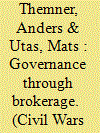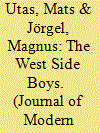| Srl | Item |
| 1 |
ID:
168597


|
|
|
|
|
| Summary/Abstract |
The contribution and situation of research brokers problematically tend to be shrouded in silence in most research texts. In this article we probe into the particular ethical and methodological challenges that we may encounter when working with brokers in conflict settings, drawing upon existing literature and contributions of this special issue. Reposing on post-colonial perspectives, we problematize both the increasing securitization of conflict research with its one-sided focus on researcher safety and the notion of researcher responsibility. Moreover, we argue that the inequalities marking researcher-broker relations are often particularly glaring in conflict settings, thus increasing the risk for exploitation.
|
|
|
|
|
|
|
|
|
|
|
|
|
|
|
|
| 2 |
ID:
147528


|
|
|
|
|
| Summary/Abstract |
There is currently a lack of knowledge about how elites rule post-civil war societies without strong state institutions. This paper argues that elites oftentimes overcome such institutional deficiencies by engaging in governance through brokerage. According to this perspective, elites outsource central state functions to influential broker figures. This is particularly true when dealing with war-affected groups that possess much violent agency. By functioning as social membranes, brokers can help elites and war-affected groups to redefine a new social contract. Liberia is employed as an example to illustrate the paper’s central arguments.
|
|
|
|
|
|
|
|
|
|
|
|
|
|
|
|
| 3 |
ID:
085980


|
|
|
|
|
| Publication |
2008.
|
| Summary/Abstract |
The 2007 general elections in Sierra Leone marked a decisive moment in the country's post-war recovery. In this article we show how political parties strategically remobilized ex-combatants into 'security squads' in order both to protect themselves and to mobilize votes. We look at the tactical and strategic motives behind ex-combatants' choice to join the political campaigning and the alternatives (such as 'watermelon politics'), and we also examine the deep distrust between politicians and ex-combatants. Focusing on politics as the domestication of violence, we shed light on the continuation of pre-war and war-time mobilization of youth into politics and demonstrate how electoral moments can legitimize violence. In hindsight, the 2007 elections strengthened the democratic process in Sierra Leone, but this article shows on what fragile ground this success was built.
|
|
|
|
|
|
|
|
|
|
|
|
|
|
|
|
| 4 |
ID:
168602


|
|
|
|
|
| Summary/Abstract |
In this practitioners note I want, with a number of cases from my own fieldworks, highlight problems and possibilities of collecting first hand material about conflict with a specific focus on research brokers.
|
|
|
|
|
|
|
|
|
|
|
|
|
|
|
|
| 5 |
ID:
084476


|
|
|
|
|
| Publication |
2008.
|
| Summary/Abstract |
The West Side Boys were one of several military actors in the Sierra Leonean civil war (1991-2002). A splinter group of the army, the WSB emerged as a key player in 1999-2000. In most Western media accounts, the WSB appeared as nothing more than renegade, anarchistic bandits, devoid of any trace of long-term goals. By contrast, this article aims to explain how the WSB used well-devised military techniques in the field; how their history and military training within the Sierra Leone army shaped their notion of themselves and their view of what they were trying to accomplish; and, finally, how military commanders and politicians employed the WSB as a tactical instrument in a larger map of military and political strategies. It is in the politics of a military economy that this article is grounded
|
|
|
|
|
|
|
|
|
|
|
|
|
|
|
|